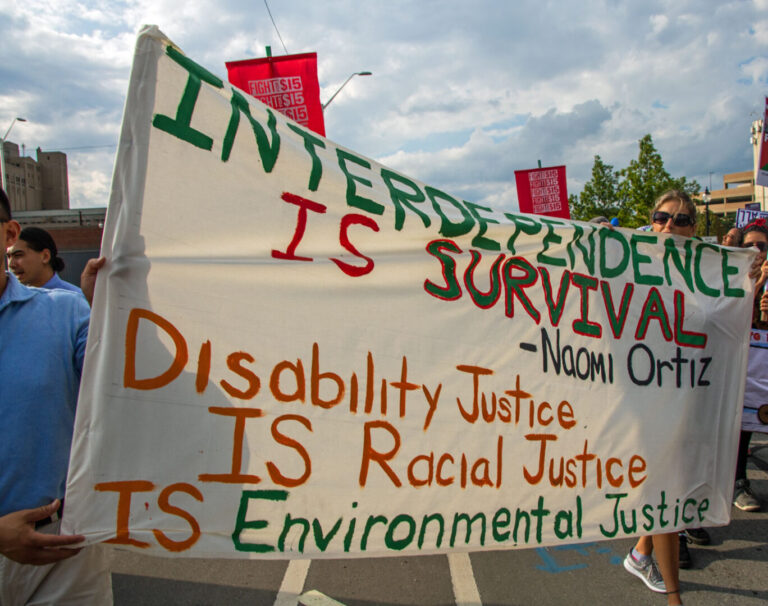The increasing recognition of critical disability studies as a generative body of work across disciplines is inseparable from a collective need to make sense of ongoing moments of socio-political crisis, emergency, and exceptionality. Theorizations of crip time emergent from lived experiences of disability are critical to the ongoing work of understanding and surviving a chronically debilitating socio-political context. Our current political moment seems to protract states of crisis to such a degree that the very notions of emergency and crisis shift under the weight of their simultaneous seeming banality and urgent ubiquity. “Cripistemologies of Crisis: Emergent Knowledges for the Present” contends that epistemologies of chronicity, illness, and trauma offer indispensable lenses through which to rethink—and care for—our collective present. The essays within “Cripistemologies of Crisis” reframe our understandings of both social and personal crisis, and explore how crisis and emergency shape the experiences and knowledges of our bodyminds in time and space. The authors collectively offer an epistemological toolkit to theorize and survive everyday states of trauma, madness, and illness as the lived impacts of such quotidian and ongoing violence. “Cripistemologies of Crisis” asks, then, what crip futures can be conjured through a centering of experiential, collective, and speculative ways of knowing with/in/through crisis.
Cripistemologies of Crisis: Emergent Knowledges for the Present
Edited by Theodora Danylevich and Alyson Patsavas
This special section considers the critical insights that theorizing experiences of disability, instability, and trauma offer to collective efforts to complicate understandings of the pace and politics of “crisis.”
A collection of “evidence” of ephemeral and everyday modes of living and surviving during crisis are presented in Crip Pandemic Life: A Tapestry” (2022–23).
When Silence Said Everything: Reconceptualizing Trauma through Critical Disability Studies
Reading X González’s, March 24, 2018, “March For Our Lives” speech—their words and silences—as an entry point into what I term a crip theory of trauma, this essay argues that the dominant narratives about and around Post Traumatic Stress Disorder (PTSD) say more about the compulsivity of the “proper” citizen subject than they do the actual embodied experience and debilitation of trauma itself. The text reconceptualizes trauma narratives, like González’s, through critical disability studies to argue that certain cripistemologies—or crip ways of knowing—trauma arise that are not otherwise available or readily accessible. Most notably, by rejecting dominant pathologizing forces and embracing crip ways of knowing, this analysis brings forth a new working definition of trauma, as an embodied, affective structure. These ways of knowing offer crucial insights for efforts to grapple with the ongoing forms of trauma enacted and perpetuated across the globe, and are particularly urgent against a political and cultural landscape that, as my reading of González’s speech makes clear, in many ways refuses to hear, see, and learn from the knowledge that trauma produces.
Solidarity in Falling Apart: Toward a Crip, Collectivist, and Justice-Seeking Theory of Feminine Fracture
In this essay, I reconceptualize feminized trauma by utilizing a queer crip feminist disability justice framework. This reconceptualizing allows for an intervention in both historical psychoanalytic and contemporary biomedical framings of the experience of gendered and sexual violence, pursuant or sequelic trauma, and associated symptoms. Both historical and contemporary psycho-logics too often imagine gendered and sexual violence as abnormal or exceptional events (e.g., “stranger rape”) which can be treated and cured individually, thus delimiting them within a white, wealthy or middle-class, cis- and hetero-feminine register. As a corrective, within the framework of everyday emergencies, insidious traumas, and cripistemologies of crisis, I position feminine fracturing and falling apart as chronic, and consider abolitionist strategies for survival, care, and solidarity beyond traditional medical frameworks for recovery. This further provides a way to understand dissociation or rather dissociative-adjacent symptomology as real, legitimate, and painful, yet also as sociopolitical products experienced differently across diverse populations—and as mundane, banal, and even expected for some. Here, feminine fracturing is symptom, method, and potential avenue for change or liberation. What does “recovery” look like when feminized trauma is endemic to the point of being so normalized and unexceptional as to be a thoroughly unremarkable part of our everyday cultural backdrop? How is this exacerbated when we examine the experiences of trans women, poor women, and immigrant and BIPOC women and femmes? I posit that there is promise in embracing a fracturing, in falling apart—as antidote to the normative and neoliberal logic of keeping it together.
Crip Collectivity Beyond Neoliberalism in Octavia Butler’s Parable of the Sower
The importance of Octavia Butler’s 1993 novel Parable of the Sower continues to crystalize, as Butler’s prescient imagining of urban California torn apart by neoliberal divestment comes to fruition. Following in the space opened up by Black feminist scholarship on Butler, the present essay examines her relevance beyond literary and cultural studies. I argue that Parable is a Black feminist crip theorization of political economy that diagnoses the disabling conditions of precarity under neoliberalism and also prescribes collectivity for crip and mad survival. Neoliberalism describes a global stage of advanced capitalism wherein governments are both incentivized and disciplined into enforcing economic policies that include privatization, deregulation, and market liberalization. As Jodi Melamed defines it, neoliberalism requires a certain kind of political governance, that puts the interests of business over the well-being of people (2011). Neoliberal governance engenders what I call “disabling contradictions,” yet the blame for conditions of precarity is deflected onto bodyminds themselves. In Parable of the Sower, Butler theorizes these disabling contradictions of neoliberal governance under advanced capitalism, drawing into focus the political economic systems that cause suffering. Parable also depicts strategies for crip and mad survival that are made possible through the conscious creation of community and networks of solidarity that counter the neoliberal state’s devaluation of bodyminds. Gathering to read and discuss the novel, rather than a distraction from the crises, furthers the emergence of crip and mad collectivities. As such, it is an urgent and timely practice for building futures for crip and mad people.



